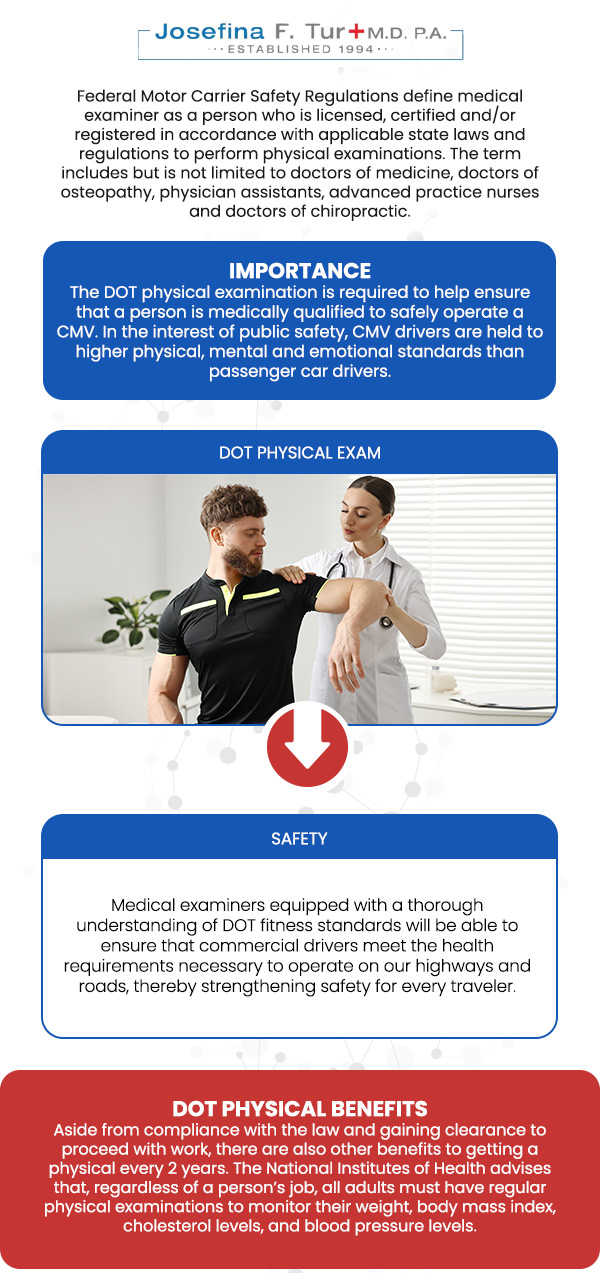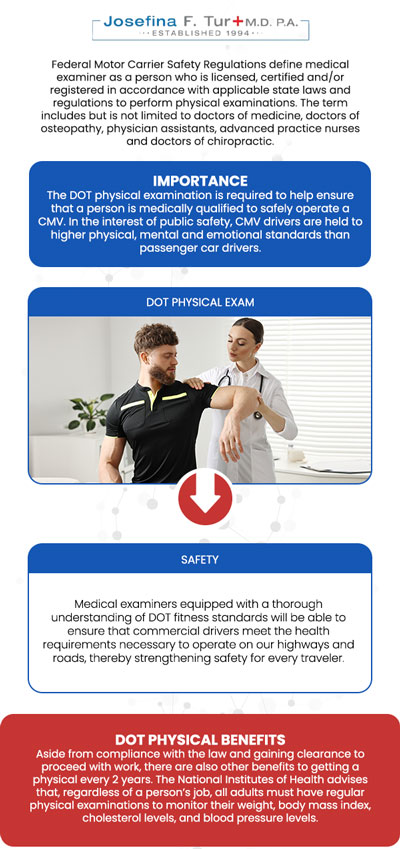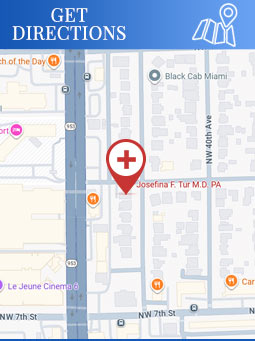DOT Physical Exams Clinic in Miami, FL
To legally operate a commercial vehicle, drivers must pass a DOT physical exam to ensure they are medically fit for the job. At Josefina F. Tur M.D. P.A., certified medical examiners conduct these essential exams with efficiency and professionalism. Her practice focuses on a thorough yet streamlined process that covers all Federal Motor Carrier Safety Administration (FMCSA) requirements, including vision, hearing, and blood pressure checks. For more information, contact us or book an appointment online. We are located at 4100 NW 9th St, Suite #100, Miami, FL 33126.


Table of Contents:
What is a DOT physical exam?
Who needs a DOT physical exam?
What does a DOT physical exam include?
How long does a DOT physical exam take?
What makes Dr. Josefina F. Tur, the best choice for DOT Physical Exams
At Josefina F. Tur M.D. P.A., we provide comprehensive DOT physical exams for commercial drivers in accordance with Federal Motor Carrier Safety Administration (FMCSA) regulations. A DOT physical exam, required by the Department of Transportation, ensures that you are physically, mentally, and emotionally fit to safely operate commercial motor vehicles.
Dr. Tur is a certified medical examiner, qualified to assess all the necessary health parameters during your DOT physical, including vision, hearing, blood pressure, and overall physical health. Our evaluation also includes a thorough review of your medical history and screening for common conditions such as diabetes, heart disease, sleep disorders, and substance abuse.
Passing your DOT physical at Josefina F. Tur M.D. P.A. is essential for obtaining or renewing your commercial driver’s license (CDL). After a successful exam, you’ll receive a medical certificate valid for up to 24 months, unless certain medical conditions require more frequent check-ins.
We understand the importance of safety and compliance for commercial drivers. That’s why we offer comprehensive Department of Transportation (DOT) physical exams for individuals who operate commercial motor vehicles (CMVs) in the United States.
Whether you’re a truck driver, bus driver, or any other commercial vehicle operator responsible for transporting passengers or cargo across state lines, our DOT physicals are designed to meet the standards mandated by the FMCSA.
If you drive a vehicle weighing more than 10,000 pounds, carry hazardous materials, or operate a vehicle designed to transport more than 15 passengers (including the driver), you are typically required to pass a DOT physical. This examination is also necessary for those obtaining or renewing a CDL. Even drivers operating commercial vehicles within Florida may need a DOT physical if state regulations are in line with federal guidelines.
DOT physicals at Josefina F. Tur M.D. P.A. are conducted to ensure that drivers are physically, mentally, and emotionally fit to operate commercial vehicles safely on the road. Our thorough evaluations help identify any medical conditions that could affect your ability to drive safely, promoting road safety for both drivers and the public. Employers can also count on us to provide quick, reliable, and compliant DOT exams for their workforce.
At Josefina F. Tur M.D. P.A., we provide comprehensive DOT physical exams for commercial drivers in accordance with DOT regulations. Our ARNPs ensure that every driver is physically and mentally fit to operate commercial vehicles safely on the road.
During your DOT physical at our clinic, our ARNPs will carefully review your medical history and conduct a thorough physical examination. This includes checking your vital signs—such as blood pressure, heart rate, and respiration—to assess your overall health. She will also evaluate your vision and hearing to confirm you meet the DOT’s minimum standards for safe driving.
As part of the examination, we perform a urinalysis, primarily to screen for underlying medical conditions like diabetes. Our team will also assess your cardiovascular, neurological, and musculoskeletal systems to identify any potential issues that could impact your ability to drive safely. Additional aspects of the exam include a review of your respiratory health, screening for signs of sleep apnea, and an abdominal evaluation for any organ enlargement or abnormal masses.
At Josefina F. Tur M.D. P.A., we understand that your time is valuable—especially when it comes to Department of Transportation (DOT) physical exams. Our team is dedicated to providing efficient and thorough DOT physicals, typically completed within 15-30 minutes. However, the exact duration may vary depending on your individual medical history and any specific needs you may have.
If you have a complex medical background or require additional documentation, we’ll make sure to address those needs without unnecessary delays. For most patients, the entire exam is finished within an hour, so you can get back on the road—and back to your regular activities—as quickly as possible.
At Josefina F. Tur M.D. P.A., we offer thorough and efficient DOT physical exams to keep you on the road and in top shape. One of our specialists ensures you meet the necessary health standards for commercial drivers, with a focus on your overall well-being. Our DOT physicals assess vital areas such as vision, hearing, and cardiovascular health, helping you maintain both compliance and peak performance. Our team personalized approach ensures that the exam process is seamless, allowing you to focus on what matters most—your driving career.
For DOT physicals that are professional, compassionate, and convenient, trust Josefina F. Tur M.D. P.A. to guide you every step of the way. For more information, contact us or book an appointment online. We are located at 4100 NW 9th St, Suite #100, Miami, FL 33126. We serve clients from West Miami, Coral Gables, Miami Springs, Virginia Gardens, Doral, Hialeah, South Miami, Sweetwater, Miami Shores, El Portal, and surrounding areas.
Check Out Our 5 Star Reviews








